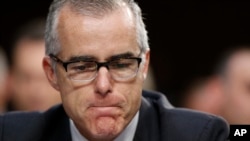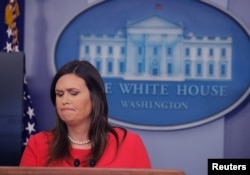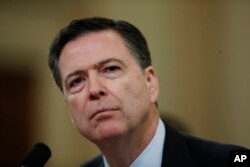The Trump administration is firing back at a former Federal Bureau of Investigation acting director who says top federal law enforcement officials considered invoking a constitutional amendment to remove the president after he fired then-FBI Director James Comey.
Andrew McCabe, in a CBS News interview, also said he opened an investigation into the president for fear that special counsel Robert Mueller's probe into connections between the Trump campaign and Russia would be jeopardized if he were fired.
The Justice Department, which oversees the FBI, called McCabe's recitation of events "inaccurate and factually incorrect." In a statement, the department also said its inspector general found McCabe "did not tell the truth to federal authorities on multiple occasions, leading to his termination from the FBI."
McCabe was fired by then-Attorney General Jeff Sessions in March 2018, just short of his scheduled retirement, denying the longtime FBI official his full retirement benefits.
"Andrew McCabe was fired in total disgrace from the FBI because he lied to investigators on multiple occasions, including under oath," White House press secretary Sarah Sanders said in a statement Thursday.
"His selfish and destructive agenda drove him to open a completely baseless investigation into the president. His actions were so shameful that he was referred to federal prosecutors. Andrew McCabe has no credibility and is an embarrassment to the men and women of the FBI and our great country."
A short time after an excerpt of the McCabe interview aired early Thursday, President Donald Trump called him "a disgrace to the FBI and a disgrace to our Country" in a tweet.
Trump also recalled the 2016 election, in which he defeated Democrat Hillary Clinton, in another tweet:
Comey, who was handling the FBI's investigation into Russian meddling in the 2016 election, was dismissed by Trump in May 2017.
McCabe told CBS that officials that month had discussed whether to invoke provisions of the 25th Amendment, which allows a vice president and a majority of the 15 Cabinet members to declare a president incapable of handling the duties of the presidency, making the vice president the acting president.
The officials ultimately did note pursue Trump's removal. But McCabe, then the No. 2 official at the FBI, said that soon after he discussed Comey's firing with the president, he ordered the bureau to begin an obstruction-of-justice investigation of Trump and a counterintelligence probe involving his alleged ties to Russia.
In the CBS interview, McCabe said he initiated the investigations to make sure they were firmly implanted should he be forced out.
"I was very concerned that I was able to put the Russia case on absolutely solid ground, in an indelible fashion," McCabe told CBS interviewer Scott Pelley, "that were I removed quickly or reassigned or fired, that the case could not be closed or vanish in the night without a trace."
Manafort case
The comments from McCabe and the forceful administration reaction to them came a day after a federal judge ruled that Trump's campaign chairman, Paul Manafort, had lied to a grand jury and the special counsel about his interactions in August 2016 with a Russian intelligence operative.
Michael Gerhardt, a professor at the University of North Carolina School of Law in Chapel Hill, said that while some may question McCabe's motives, "he set in motion a process that seems to have been well worth considering under the circumstances. The American people depend on Justice Department and other executive branch officials who place loyalty to the rule of law above all else."
Gerhardt, a leading constitutional scholar, told VOA that "we trust that a system devoted to the rule of law and the idea that no one is above the law will be effective, especially when it is under fire for political reasons."
The revelation that senior Justice Department officials contemplated calling together Cabinet members consistent with the requirements of the 25th Amendment "is an issue of monumental importance in American history," according to Bradley Moss, a Washington attorney specializing in national security matters.
'Extraordinary measure'
"At no time in American history since the passage of the 25th Amendment in 1967 has an actual, formal vote ever taken place to invoke the provisions of that amendment and remove the president from office against his will," Moss told VOA. "It is an extraordinary measure designed only for the most extreme of circumstances and that will only be viable if the president's own political allies and appointees were to support it."
Associate professor Aaron Coleman, who chairs the history and political science department at the University of the Cumberlands in Williamsburg, Ky., also views things moving into unchartered constitutional terrain.
"For the FBI to launch an investigation without a congressional request, a request from the attorney general, a presidential request or a special investigator is historically unprecedented," Coleman told VOA. "Were the FBI to initiate 25th Amendment removal proceedings without congressional authority or guiding legislation, it would, I believe, trigger a potential constitutional crisis."
McCabe, in the CBS interview — which is to air in full on Sunday on the 60 Minutes program — confirmed reports from months ago that Rod Rosenstein, the deputy attorney general who appointed Mueller to investigate Russian interference in the 2016 elections, considered wearing a wire to meetings with Trump to document their conversations.
While the Justice Department has stated Rosenstein made the offer sarcastically, McCabe said the suggestion was taken seriously at the time and was discussed more than once.
Ken Bredemeier contributed to this report.







